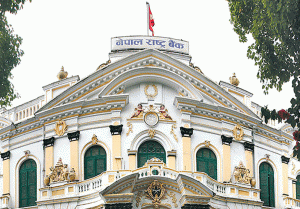
The day’s op-ed pages of broadsheet dailies published in Kathmandu have covered issues ranging from politics to economics and education to elections. Similarly, The Kathmandu Post has published an interview with senior Maoist leader Narayan Kaji Shrestha.
CK Lal’s analysis of the ‘Dabloos’

Today’s Republica carries commentator CK Lal’s piece as its lead op-ed article. In his op-ed ‘Realm of divertissements’, Lal talks about almost every topic that’s been discussed by the ‘urban burgeiose’ (the White Shirts ‘Dabloos’) from Dr KC’s hunger strike to the Indo-China standoff and the Pakistani judiciary’s move to prevent Sharif from becoming the first Prime Minister in the country to complete a full term in office.
Lal’s main target, however, are the Dabloos as he associates the major events of the week with their thought process. Lal argues that the PEON (the Permanent Establishment of Nepal)’s worst fear is of the Madheshi professionals who challenge their hegemony. Similarly, he accuses the PEON and the Dabloos, who are taking to Twitter and Facebook to support Dr KC, of double standards. He says that the very system that feeds the Dabloos is what Dr KC is after.
He concludes by saying that the Doklam standoff between India and China has given the PEON a ‘stick to beat India in the name of neutrality’. He goes on to add that in the event of an Indo-China war, the Gurkhas will probably form India’s first line of defence. But having said all that, the core issue of the public life in Nepal is still Madhesh. “The longer PEON hides its face, higher will be the price of political avoidance.”
Five prominent scholars pen op-ed on Medical Education Act

Five prominent doctors and educationists of the country, considered experts in their respective fields, have written an op-ed for Kantipur analysing the various issues related to the draft Medical Education Act. They start the article by mentioning Dr Govinda KC’s fast-unto-death and asking why the new act is relevant in the present context. Dr Kedar Bhakta Mathema, Dr Arjun Karki, Dr Madan Upadhyaya, Dr Ramesh Kanta Adhikari and Dr Bhagwan Koirala first trace the history of the bill in the Mathema Commission formed by the government to recommend a medical education policy. Similarly, the article touches upon the recommendations made by the Bhagwan Koirala committee to draft the proposed Act. The writers of the piece say that the recommendations were made keeping in mind the interest of the people and not of specific interest groups. They say that the new Act has not been brought to cause harm to private investors.
In a reply to those who want the government out of the healthcare sector, the authors argue that healthcare is like no other commodity. While you can exchange things you buy at the store if they are faulty, you cannot do that in the case of health. The main aim of the bill, according to the authors, is to create an environment in which doctors are skilled and qualified and ready to go to rural areas to serve the people. The authors say that the state needs to make it possible for poor students to become doctors based on their merit.
The writers, however, warn that the bill will not be a magic pill against everything that ails the medical sector in Nepal, but it will give a good start. Similarly, if the various amendments that have been registered in Parliament are incorporated into the bill, there is fear that the very principles on which the new draft law is based, could be eroded. They also fear that the amendments might weaken the teeth of the regulatory body proposed in the bill, and that would have disastrous consequences.
They conclude by urging the lawmakers to take the bill seriously and not try to affect the core principles on which it is based.
The Narayan Kaji interview

Today’s edition of the The Kathmandu Post has an interview with senior Maoist leader Narayan Kaji Shrestha. In the interview, Shrestha says that the government is doing all it can to get the constitution amendment bill passed. However, it does not have the two-third majority required for that to happen. He says the government is ready to put the amendment bill to vote, but the RJPN must promise that it will accept the outcome of the vote. On the third round of elections, Shrestha says polls will take place in the Terai in September, regardless of the participation of the RJPN.
He also says that India’s Nepal policy has seen little change in the last few years. He says that Nepali politicians need to tackle their own internal problems first.
























